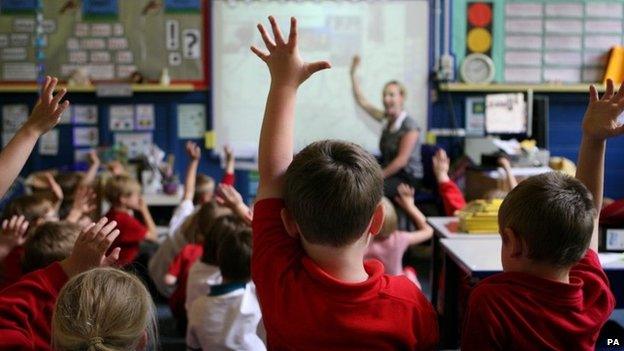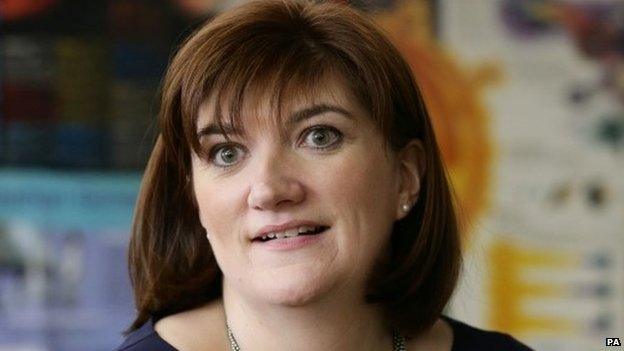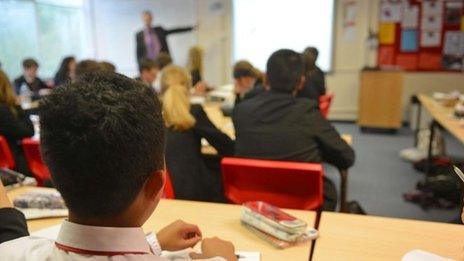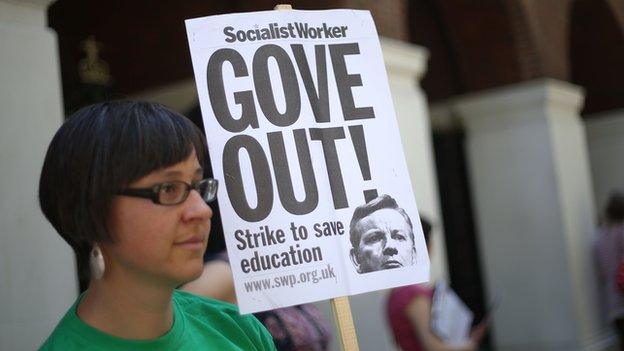Top teachers could get 2% pay rise in new settlement
- Published

Any 2% pay rises awarded by schools will be performance-based
Schools in England and Wales are to be given the power to hand top performing teachers a pay rise of up to 2%.
The move was announced as part of a pay settlement for nearly a million public sector workers.
The overall settlement, external will stay within a 1% pay limit agreed by ministers in 2012 but schools will get discretion to award the most deserving teachers more.
Education Secretary Nicky Morgan said this flexibility was possible because of the "strong economy".
But Labour said the announcement was "not a commitment to new money for schools".
Amid suggestions of a rift in the coalition over the issue, Deputy Prime Minister Nick Clegg said the settlement was affordable and the government should be "as generous as it can be", where possible, to public sector workers.
The exact pay of teachers in the maintained sector is set by schools but within nationally agreed levels.
Teachers received a 1% rise last year in line with the two-year pay cap across the public sector introduced in 2012. The 1% cap is to be extended to 2015-2016.

Analysis by education correspondent Sean Coughlan
Higher pay for some teachers might be seen as an olive branch. But the devil will be in the detail.
How many "top performing" teachers will be eligible for this extra tier of pay? And if the overall pay budget is not increasing, how will a higher grade of pay be funded?
Will it depend on some teachers not getting the minimum 1%? Or will it mean capping pay for head teachers? Or will it be left to heads to come up with their own funding arrangement?
Don't expect celebrations in the staffroom if it depends on some staff going backwards in pay, in real terms, rather than forwards.
Teachers' unions, getting ready for the fire and brimstone of their annual conferences, are likely to see it as an attempt to put gift-wrapping around another year of austerity.

But ministers have decided that the upper end of the main pay band will increase by 2% and schools can decide whether to award this based on performance.
This follows a recommendation from the School Teachers Review Body (STRB) that the maximum award in the main pay range for teachers, currently £32,187 in England and Wales bar London, should be allowed to rise by 2% next year.
'Affordable'
Education Secretary Nicky Morgan said it had always been the government's policy to recognise the contribution of the best-performing teachers.
"This is particularly important for those who have been in the profession for a few years and are very important to the future of their schools," she said.

Nicky Morgan said the best-performing teachers deserved recognition
"Because we have built a strong economy, we are able to allow this flexibility."
Earlier this week, the Lib Dems accused the Conservatives of trying to block the proposals, although their coalition partners insisted there was no disagreement.
Party leader Nick Clegg told the Daily Mail online, external that "quite a fierce debate" had taken place in government over the issue and suggested that the scope to reward the best teachers had been "resisted" by the Conservatives.

Pay settlement details
Average increase of 1% for the armed forces, independent contractor GPs and dentists, prison governors and officers, senior military and the judiciary
No pay increase for police and crime commissioners and NHS senior managers
Senior civil servants will get a 1% average rise although there will be flexibility for individual departments
Two-year pay deal for NHS workers was announced last year.

The NASUWT union said teachers had suffered a real terms pay cut of thousands of pounds since 2010.
"There is a teacher recruitment and retention crisis caused by the coalition's relentless attacks on teachers' pay, pensions and conditions of service," said its general secretary Chris Keates.
"What makes the situation even worse is that even when the review body recommends a percentage award, schools are not obliged to pay it."
'Pay restraint'
Details of other public sector pay awards have also been revealed following the recommendations of a number of different pay review bodies.
The government has also accepted the recommendations of the Senior Salaries Review Body which means that senior military officers and members of the judiciary will get, external a 1% pay rise.
But pay rates of police and crime commissioners will remain unchanged for 2015-16.
Chief Secretary to the Treasury Danny Alexander said the settlement was "balanced and affordable". "Pay restraint has been very difficult for many but has helped us to protect vital public service jobs while we deal with Britain's deep financial problems," he said.
Labour's shadow education secretary Tristram Hunt said the Conservatives were planning "extreme" spending cuts.
He added: "Their plans will see spending on schools cut in real terms. Let's be very clear, this is not a commitment to new money for schools to fund a pay increase of 2%."
- Published10 March 2015

- Published10 June 2014
